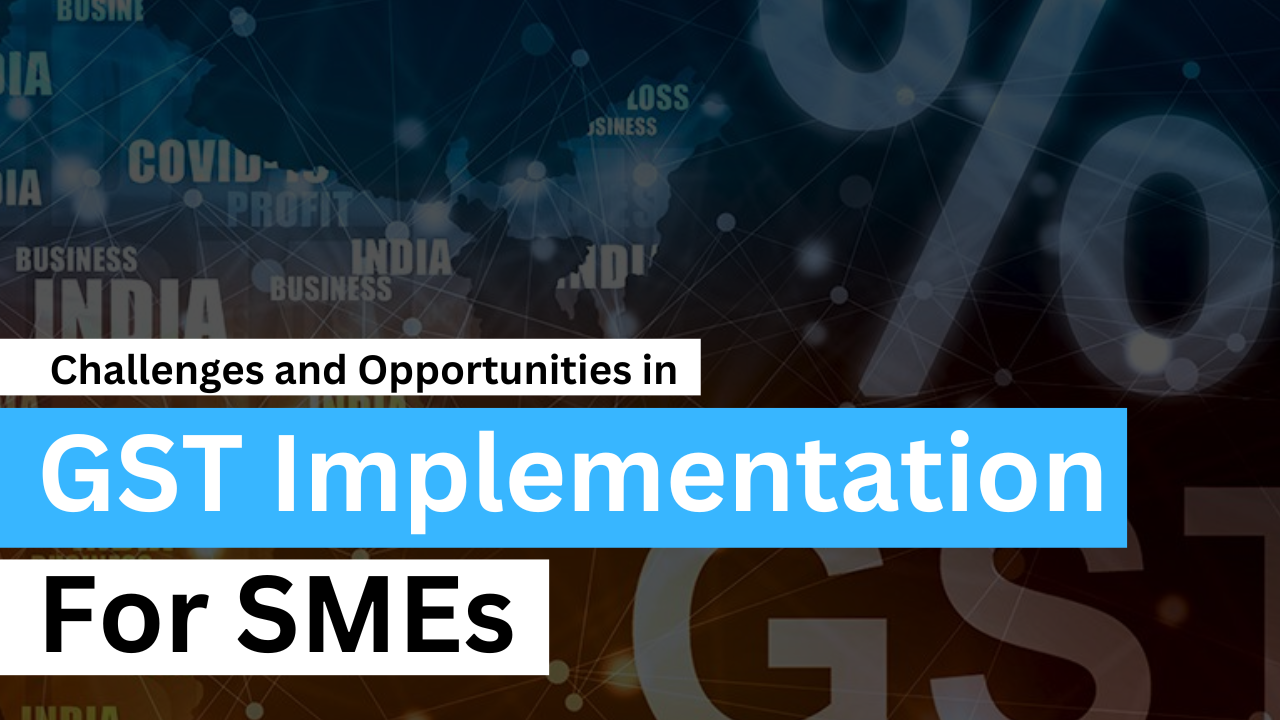The Goods and Services Tax (GST) was introduced in India with the promise of simplifying the complex tax structure and fostering economic growth. While it has undoubtedly streamlined the tax system, there is a significant impact of GST on small businesses. GST implementation has posed unique challenges for Small and Medium Enterprises (SMEs) but it can be handled with proper SME taxation planning.
Challenges for SMEs:
- Compliance Complexity: One of the most significant challenges faced in small business GST compliance is the complexity of GST compliance. SMEs often lack the resources and expertise to navigate the intricacies of GST filings, leading to errors and penalties. The regular changes in GST regulations for small enterprises can further exacerbate this problem.
- Technology Adoption: GST compliance requires the use of technology for tasks such as invoice generation and filing returns. Many SMEs, especially those in traditional sectors, struggle with the adoption of digital tools, making it challenging to comply with GST requirements effectively.
- Working Capital Blockage: Under the GST regime, taxes are paid on the date of invoice, irrespective of whether the payment for the invoice has been received. This can lead to a temporary blockage of working capital for SMEs, affecting their cash flow.
- Increased Competition: GST has made it easier for businesses to expand across state boundaries. While this presents opportunities, it also means increased competition for SMEs, especially if they are not well-prepared to compete on a broader scale.
Opportunities for SMEs:
Strategically managing the changes in the tax landscape through GST implementation not only ensures compliance but also opens doors for operational improvements, cost savings, and increased competitiveness in the evolving business environment.
Despite the myriad challenges, the implementation of GST presents a silver lining of significant opportunities for SMEs such as:
- Market Expansion: With GST eliminating inter-state barriers, SMEs now have access to a larger market. They can explore new regions for expansion without worrying about the complexities of multiple tax regimes.
- Input Tax Credit (ITC): GST allows businesses to claim input tax credit on taxes paid on inputs and services. This helps SMEs reduce their tax liability, resulting in cost savings and improved profitability.
- Digital Transformation: While the initial hurdle of technology adoption can be daunting, it presents a long-term opportunity for SMEs to modernize their operations. Implementing digital accounting and invoicing systems can streamline processes and enhance efficiency.
- Consultancy Services: SMEs can benefit from professional consultancy services, such as those offered by firms like Master Brains Consultants. These services can help SMEs understand and navigate the complexities of GST compliance, ensuring accuracy and minimizing the risk of penalties.
- Export Opportunities: GST has made it easier for SMEs to engage in export activities. With the introduction of GST refunds for exporters, SMEs can explore international markets more competitively.
Practical Tips for SMEs to Ensure Smooth GST Implementation
Before delving into practical tips, it’s crucial for small and medium enterprises to approach GST implementation with a proactive mindset. Here are key strategies to ensure a seamless incorporation of GST into your business operations:
- Invest in Training: Provide training to your employees on GST compliance. Educated and well-informed staff can significantly reduce errors and ensure smoother operations. Consult your indirect tax consultant who can help you design processes for you to implement GST effectively in your organization.
- Leverage Technology: Embrace digital tools and accounting software to automate your GST compliance processes. This will not only improve accuracy but also save time and resources.
- Regular Updates: Stay informed about changes in GST rules and rates. Government policies can change, and being up-to-date will help you adapt quickly.
- Professional Assistance: Consider engaging financial and GST consultants, to handle the complexities of GST. Their expertise can prove invaluable in ensuring compliance and optimizing your tax strategy.
Change is a constant in the business landscape, and a successful business is one that adeptly adjusts to the ever-evolving amendments in business and taxation laws. While transitions can be challenging, with the right GST advisory services, they can become a seamless journey. Ensure your business is GST-ready – not just to meet regulatory requirements but to thrive in this new era of taxation. Overcoming the challenges associated with this change is not only possible but can be achieved with finesse. Embrace this new form of taxation, turning what may seem like a hurdle into a cakewalk. Position your business to not only comply with regulations but to excel in the dynamic and transformed tax environment.
In conclusion, GST implementation for SMEs is a double-edged sword, with both challenges and opportunities. While the taxation issues for SMEs can be daunting, SMEs that adapt and embrace new developments & amendments and stay proactive can turn these challenges into advantages. With the right approach & right GST consultancy services available to organizations , GST can become a catalyst for growth and competitiveness in the SME sector.




